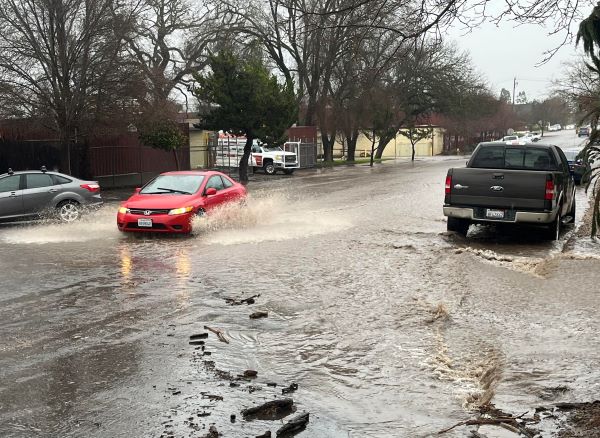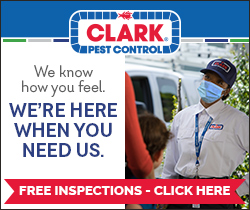Public advised to avoid contact with flood waters

Flood waters on Oak Street in Paso Robles. Photo by Richard Mason.
Flood waters can contain contaminants that increase the risk of illnesses
– As a series of storms causes flooding across San Luis Obispo County, health officials are advising residents to avoid contact with flood water, ocean water, creeks, and lakes.
“The most urgent message is the one you are hearing from our first responders and Office of Emergency Services: do not drive into water if you cannot see the roadway,” said County Health Officer Dr. Penny Borenstein. “From a health perspective, it is also important to know that flood waters can contain contaminants that increase the risk of illnesses such as rashes, fever, chills, ear infections, vomiting, and diarrhea. Even when flooding starts to recede, it’s important to avoid contact with flood water, ocean water, creeks and lakes for several days after a storm.”
Rainstorm runoff is known to transport high levels of disease-causing organisms such as bacteria, viruses, and protozoa from the watershed and urban areas to the ocean. It may contain untreated sewage, hazardous materials, and runoff from agricultural areas and dairy ponds. Young children, older adults, and people with compromised immune systems are especially vulnerable to these waterborne pathogens.
When returning to flooded areas after a storm, health recommendations include:
- If you must work in areas that have been flooded, wear boots and gloves.
- Before entering a flooded structure, be sure the main electrical switch is off. Do not turn it back on until you are certain there has been no damage to wires or appliances connected to the electrical system.
- If you smell gas or suspect a gas leak, call 911. Then call SoCal Gas at 800-427-2200. Warn your neighbors of the potential problem.
- If you are cleaning up a flooded area, wash your hands frequently and thoroughly. If you have children who have been in contact with the water, be sure they wash their hands, too.
- Keep children and pets away from floodwaters and outdoor areas that have been recently flooded. Remove shoes and wipe paws before returning indoors.
- If you have open cuts or sores, protect them from the water. Keep them clean by washing them with soap and applying an antibiotic ointment to discourage infection. If a wound develops redness, swelling or drainage, seek immediate medical attention.
- If you swallow floodwater, contact your healthcare provider immediately because of the risk of hepatitis A infection. While the hepatitis A virus will not pass through skin, there is a risk if you swallow water. Your healthcare provider will determine whether you should receive medication to prevent infection.
- If you are uncertain about the quality of drinking water, use bottled water. Check with your local water provider for any boil water orders. If you have a domestic well, it may require disinfection if it was impacted by floodwaters. See guidelines at slocounty.ca.gov/wells.
- If you have toys that have been in contact with floodwater, disinfect the toys before allowing children to play with them. You can disinfect toys using a solution of 1/4 cup of bleach in one gallon of water. For general disinfection of surfaces, use a cloth soaked with 1 tablespoon of bleach in one gallon of water.
- If you have lost power—the USDA notes that your refrigerator will keep food safe for up to four hours during a power outage. Keep the door closed as much as possible. Discard refrigerated perishable food such as meat, poultry, fish, eggs, and leftovers after four hours without power. Freezer foods may last from 48 to 72 hours if the freezer is full and the door remained closed. After a power outage, never taste food to determine its safety. If in doubt, throw it out. See detailed recommendations on food safety during and after a power outage.
- Contact your local sewer authority if solid waste from sewage is visible.
- Contact your insurance company for additional guidance if your home sustained water damage.
For more information on flood recovery, see www.cdc.gov/disasters/floods/after.html.
For local storm updates, visit ReadySLO.org and follow the County of San Luis Obispo Office of Emergency Services at twitter.com/slocountyoes and Facebook.com/SLOCountyOES.
Comments
The news staff of the Paso Robles Daily News wrote or edited this story from local contributors and press releases. The news staff can be reached at info@pasoroblesdailynews.com.






















